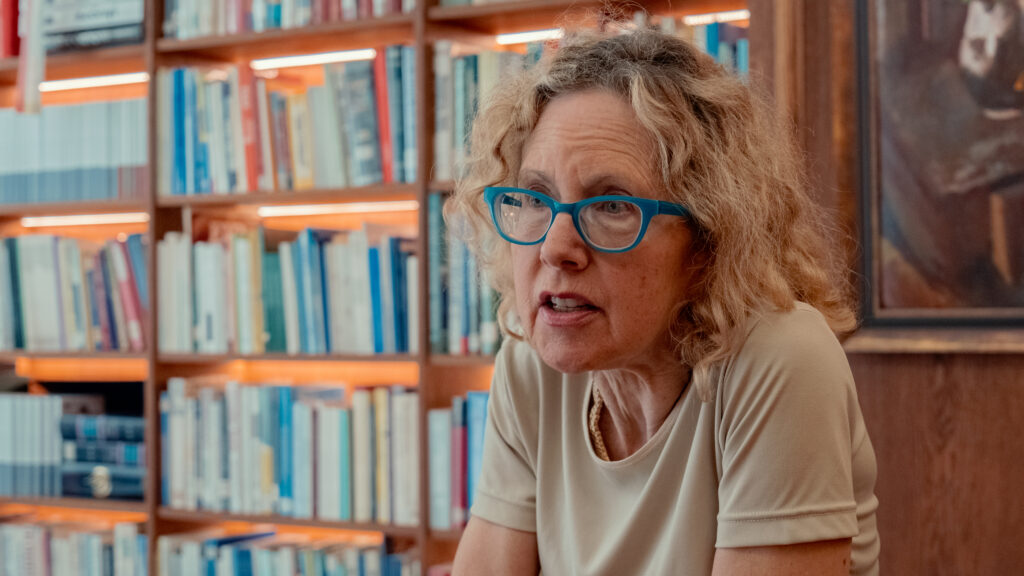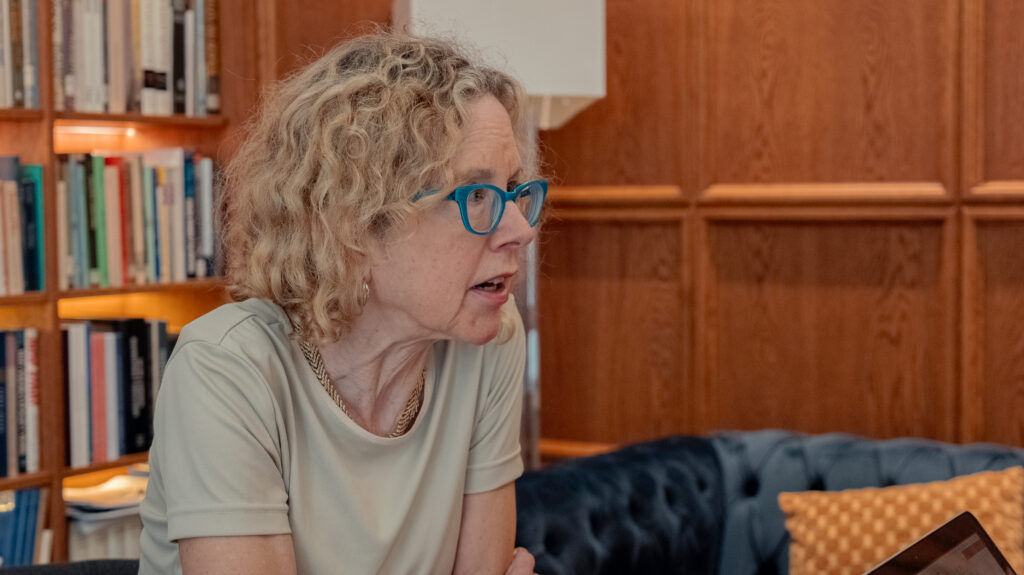Heather Mac Donald is an American conservative political commentator, essayist, lawyer, and author. She is a Thomas W Smith Fellow at the Manhattan Institute, and a contributing editor of its City Journal. She is a recipient of the 2005 Bradley Prize. Mac Donald holds a BA in English from Yale University, graduating with a Mellon Fellowship to Cambridge University, where she earned an MA in English; and she holds a JD degree from Stanford University Law School. She lives in New York City.
***
Conservatism and liberalism both have a vision for the family. Why do you think the conservative model is better?
Empirical evidence demonstrates the superiority of the traditional understanding. Data show that on average children raised with single mothers face disproportionate challenges in life. They have high rates of crime, high rates of dropping out of school, high rates of single parenthood themselves as teenagers. Such negative outcomes are not the result of ‘poverty’, which is in any case a very relative concept in the US, since the individuals whom the government classifies as poor almost invariably have smart phones, cable TV service, air conditioning, and so much access to food that they are overwhelmingly obese.
Conservatives say that marriage is a union between a man and a woman, and family should be based on the union of parents and their children. Do you agree?
I agree with this model, but we have become tongue-tied to assert its validity. Feminism makes it very hard to say that fathers are essential to their children. If we can’t recognize the simple truth that men and women are different, and that fathers bring an extraordinary range of skills, virtues and values to raising children, then feminism is deeply flawed. The millennial-long tradition of mothers and fathers has proven to be the best way to raise children who can contribute to humanity.

And what about the diverse family structures, such as single parents, same-gender couples, stepfamilies, married or common-law couples with or without children?
Tragedies happen. Spouses become widows and their children are raised by the remaining parent; children become orphans; and some children have never had married parents in the first place. The problem is when the single-parent structure becomes the norm. There are some single mothers who beat the odds, who do heroic work to raise law-abiding young boys. It can be done, but the odds are against them. Society is more likely to thrive when males are raised with the expectation that they will become a father to their child. They follow the marriage script: making themselves marriageable by not giving in to their violent impulses, by being future-oriented, by being a good worker, by not blowing up at their boss and storming out of a job. The male ego and the male libido need to be civilized, and there’s no better institution for civilizing males than marriage.
‘Society is more likely to thrive when males are raised with the expectation that they will become a father to their child’
And what about two men raising a boy in a family? They call it a family. Which is better for the boy: this kind of structure where there is care, or a state institution where he doesn’t see the homosexual patterns of life?
Well, that’s tough. There is a distinction to be made between adoption of abandoned or orphaned children and gay ‘procreation’ via surrogacy. In the latter case, those two male parents have deliberately created a situation where they are depriving a child of his biological parent. One can imagine the response: okay, we will also involve the birth mother in the child’s life. But this asks too much of children. Children are conservative creatures. They don’t like change or too many complications created for the convenience of adults. By analogy: divorce is traumatic. Yet we have created a narrative in the United States that divorce is good for children, because parents thought it was good for themselves. They rationalized the real. It turns out that divorce is very bad for children, and yet adults don’t want to recognize that fact, because they place their own convenience ahead of reality. The same is true for those two gay parents. They may feel fulfilled by spawning a child via a surrogate, but it’s asking a lot of that child to give up having a real mother, and to just pretend that this very artificial way of having children is indistinguishable from the traditional way.
Many believe that marriage is inseparable from its religious roots: this institution was created by God, not by men, they say, thus it shouldn’t be taken out of context or made profane. Do you agree?
It depends on how you define transcendent. I would say the value of marriage is a truth that applies across time for human beings. But I don’t think its origin is in God, but rather in the evolution over hundreds of thousands of years of the optimal environment for raising children. I can reach the same traditional values that a religious believer does based on observation; I don’t need to resort to a claimed sacred text in order to ground my understanding of the family. I would add that believers don’t have a particularly robust record at this point when it comes to divorce, and possibly also to out-of-wedlock childbearing.

The US is a two-faced society: it has strong Christian traditions, family values and strong woke/gender intentions as well; they exist parallel to each other. How strong standing does the traditional family model have in the American mind?
The traditional family model is endangered. Divorce became common in the 1970s; about half of all American families got divorced, and many children took away from that experience that marriage doesn’t work. That was the wrong conclusion to draw. Here’s the rule: if you don’t have children and you’re married, you can get divorced. But once you have children, the game changes, because those little beings need stability, and they want to know that they’ve got their two parents there.
‘American families got divorced, and many children took away from that experience that marriage doesn’t work’
There’s also a very perverse mentality in the United States now, which is that it’s too expensive to get married, because you have to have a big wedding. Having children is viewed as less onerous, imposing less obligations than getting married, and so childbearing in a large part of the American community, certainly in the black community, it is just tragically haphazard. A male might have children by several different females, and a female will have children by several different males. Sociologists refer to this practice as ‘multipartner fertility’. The resulting arrangements, one cannot even call them families, are chaotic, especially for the children. Drug addiction is also an extremely large problem, and the situation for the children of drug addicts is heart rending. Some people have some vague ideas about what would be the ideal family arrangement, but they don’t feel the necessity of living by that ideal themselves. Instead, child conception and childbearing have become very random and anarchic. If this does not change, we are lost.
There is the old Republican concept that the state doesn’t interfere in private matters, but now it might be high time you need some regulation on family matters.
This is a big issue right now in the Trump administration. The President is using government power to affect a lot of things that conservatives like. He’s telling universities that they can’t have these ridiculous Diversity, Equity and Inclusion bureaucracies any longer, they can’t use race for political purposes. Trump is even coming close to dictating what can and cannot be taught. Right now, the exercise of executive power is accomplishing many things that conservatives have long sought. But what if the other side were doing this? (Admittedly, a Trump supporter would say, with considerable justification, the other side has been doing that for years.) Everything we do is setting a precedent. If you’re going to use government power to do things that you like as a conservative, are you willing to have a Democratic left-wing liberal administration use those same tools to further its agenda?

On family: Trump should ideally say, no more welfare for single mothers; if you want welfare, you have to be married. That would have a large effect on child welfare, but it would take an enormous amount of political capital. But imagine that a Biden administration or a Kamala Harris administration says: we believe in the rainbow diversity of families, and we think that it would be better for children if they had single sex parents or trios of parents, and we’re going to subsidize that. So the problem with government power, especially at the federal level, is that it’s very strong and monolithic. There is a risk of a liberal government destroying the remaining pockets of traditional values.
Are there any elements of the Hungarian family regulations that the US government could incorporate into its family policies?
Well, we already have family tax credits, but I’m not a big believer that people are that calculating in making fertility decisions. Maybe the professional class is out there with its calculator deciding what its after tax returns are if they have children. But most Americans, especially in the lower middle class, are acting pretty impulsively. I’ve become somewhat of a policy sceptic over the last couple decades. I think there’s an illusion of power that you can tweak the tax code and you’re going to affect behaviour. I call this policy porn. Most behaviour comes from large cultural forces and beliefs, and here feminism is extraordinarily impactful, modernity is very impactful. It may turn out that the large family was a result of very high rates of child mortality and the inability to control fertility. But as soon as you give human beings a choice, they’re going to choose smaller families. There will be some of exceptions, of course, but that may not be the norm. We were programmed to have six or eight children when most kids were dying before they were age two. That’s no longer the case.
I also believe that a strong factor in the demographic decline in the West is the desire to self-cancel. It’s the suicide of the West. We are the only civilization in the world that believes that it is responsible for the rest of the world’s problems, when in fact, we’re the solution to the rest of the world’s problems. But we are applying deconstructive acid to our own past and our own greatness. No other civilization subjects itself to such treatment. This is why the elites favour mass migration. They want to cancel their own demographic. They don’t believe they have a right to exist. White males do not have a right to exist in America. They are the enemy. They can be the most qualified for a job, and they’re still going to be viewed as a pariah and passed over for a lot of employment.
‘They don’t believe they have a right to exist. White males do not have a right to exist in America. They are the enemy’
Finally, a quotation from the summary of Amazon.com regarding your book, The Diversity Delusion: ‘Diversity commissars denounce meritocratic standards as discriminatory, enforce hiring quotas, and teach students and adults alike to think of themselves as perpetual victims…Heather Mac Donald argues that we are creating a nation of narrowed minds.’ What are the chances that America avoids becoming a country of narrowed minds?
Well, I’m a pessimist by nature, but in the first two months of the Trump administration, I found myself uncharacteristically optimistic. Trump came in with such force, and his changes were so sweeping, I thought maybe we had a chance to beat this thing back. White males would no longer take it any longer, white Americans would no longer accept the race hustle. They would speak the truth: this is not a racist culture any longer. It once was; America was white supremacist, but we are not that society now, and we’re not going to be held hostage by unjustified racial guilt. I think there is a chance, especially if we could win the White House again, that we will destroy the hold that identity politics has on the guilty American mind. If just one person like Trump says: ‘You can’t scare me by calling me a racist,’ and enough people follow that, it just might work. I never would have believed that half a year ago, but his administration has shown such creativity in its targets and in its refusal to be cowed. Trump says things that you’re not allowed to say, and doesn’t say the things that you’re required to say. And that’s very liberating. I only hope that he has not squandered his gains so far with an ill-conceived trade policy.
Read more of our interviews:








